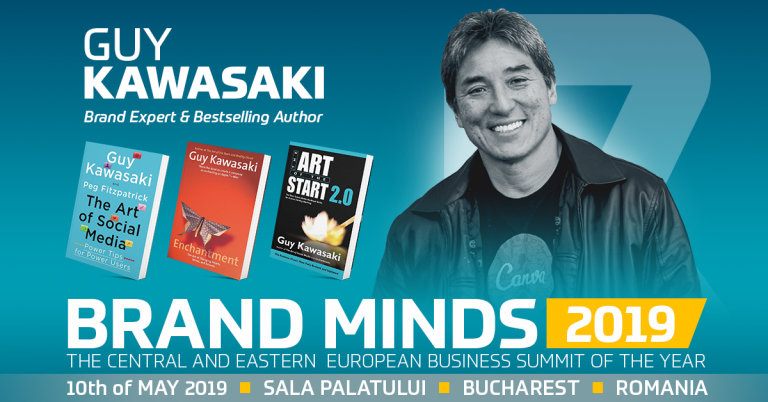Guy Kawasaki is one of the best brand experts and he was a keynote speaker at BRAND MINDS 2019.
BRAND MINDS is The Central and European Business Summit taking place in Bucharest, Romania.
Guy Kawasaki is the Brand Expert of Canva and an executive fellow of the Haas School of Business (UC Berkeley). He was the Brand Expert of Apple that enforced and maintained the Macintosh cult for years.
In 2013, Guy Kawasaki became a special advisor for the CEO of Google’s Motorola division. Two years later, in 2015 he was appointed to the board of trustees of the Wikimedia Foundation.
Kawasaki is charismatic, open and honest, often breaking myths on business and entrepreneurship. He helps first-time startup founders and all aspiring entrepreneurs understand the nitty-gritty of entrepreneurship with humour and witty comparisons.
Best-Selling Author of 8 Books on Entrepreneurship
Guy Kawasaki wrote 13 books of which 8 are focused on marketing, communication, business development and entrepreneurship.
Here they are:
1. How to Drive Your Competition Crazy
Whether you are launching a new product or service or trying to hold your own against a competitor with greater resources, this is a comprehensive blueprint for success because Guy delivers on the promise that the best defence is a good offence.
2. Selling the Dream
Selling the Dream is a handbook and workbook for putting evangelism into action. Kawasaki charts a complete blueprint for the beginning evangelist that covers such topics as how to define a cause, how to identify good and bad enemies, how to deliver an effective presentation, and how to find, train and recruit new evangelists.
3. Rules for Revolutionaries
Rules for Revolutionaries explains how to create products and services and introduce them to the marketplace. The intended reader is anyone who wants to catalyse innovation and change. Many large companies have used the book to re-energize their product development and research functions.
4. Reality Check
This book is a compilation of Guy’s best wisdom, wit, and contrarian opinions in handy book form. From competition to customer service, innovation to marketing, he shows readers how to ignore fads and foolishness while sticking to common-sense practices.
5. Enchantment
Enchantment can happen during a retail transaction, a high-level corporate negotiation, or a Facebook update. And when done right, it’s more powerful than traditional persuasion, influence, or marketing techniques.
6. APE: Author, Publisher, Entrepreneur–How to Publish a Book
APE is 300 pages of tactical and practical inspiration. People who want a hype-filled, get-rich-quick book should look elsewhere. If you want a comprehensive and realistic guide to self-publishing, APE is for you.
7. The Art of Social Media
To write this book, Guy teamed up with Peg Fitzpatrick, a social media expert. With over one hundred practical tips, tricks, and insights, Guy and Peg present a bottom-up strategy to produce a focused, thorough, and compelling presence on the most popular social media platforms.
8. The Art of the Start 2.0
This book is the de-facto standard for learning how to start a company. Whether you’re an aspiring entrepreneur, small-business owner, intrapreneur, or not-for-profit leader, there’s an over-abundance of advice. The Art of the Start 2.0 solves that problem by distilling Guy’s decades of experience as one of the most hardworking and irreverent people in business.

Serial Startup Entrepreneur
His time with Apple inspired him to change his life and turn to entrepreneurship and the world of business.
Here are the companies which Guy Kawasaki co-founded:
1995 – Fog City Software, a company that developed email software for Macintosh
1998 – Garage Technology Ventures, a venture capital firm that has made investments in Pandora Radio, Tripwire, The Motley Fool and D.light Design.
2007 – Nononina, the owner of Alltop, a website that provides information collected from news websites and blogs.
2007 – Truemors, a website that allows users to post information about people and events and have them rated by viewers; acquired by NowPublic, a global crowdsourcing social news website of ordinary citizens.

Guy Kawasaki at BRAND MINDS 2019
Silicon Valley Venture Capitalist
I’m a marketer. Hopefully I can recognize visions that can sell.
Guy Kawasaki
Although he defines himself as a marketer first and foremost, Guy has found a new passion and career: investing in startups. As a Silicon Valley venture capitalist, he is always on the lookout for the next Google or YouTube or CISCO.
He listened to many aspiring entrepreneurs pitching their startups ideas and turned his experience into easy to implement recommendations on how to deliver a successful pitch.
A very necessary skill for young entrepreneurs: brevity and speed. You must do everything fast and to the point.
Here are the organizations that Guy has invested in or advises:
- Evernote is a suite of software and services that allow users to capture, organize, and find information across multiple platforms; the company is valued at $1B and raised $290M.
- BagTheWeb offers a service that allows users to organize the links they find most interesting into a cohesive unit.
- Enthrill Distribution is a digital rights management platform for publishers, providing device-agnostic, direct delivery of eBooks to consumers; it raised $4.2M.
- Paper.li is a content curation service; it raised CHF150K.
- Sixense has designed the ideal control platform for interacting intuitively with digital media in homes worldwide.
- TicketLeap, an online ticketing platform enabling event organizers to sell, market and manage their events in one place; it raised $10.3M.
- uStream provides a live interactive broadcast platform, acquired by IBM, raised $103.8M
- Visible Measures provides internet video publishers and advertisers with solutions that help measure the video-content consumption of users; it was acquired by AcuityAds and raised $71.8M.
As a long time entrepreneur, innovative marketer and venture capitalist, here are 6 pieces of knowledge for startup founders:
- The two essential roles in a startup – someone who can make the product and someone who can sell it.
- It’s the soft skills that are hard to learn, not the hard stuff. You can always hire an accountant.
- Put aside market-driven data and create the product you want to use.
- Sales fixes everything.
- The purpose of any company is to create customers and to create customers you need to finish your prototype. So focus on finishing your prototype and creating customers.
- The opposite of success should be learning.
Guy Kawasaki – the Apple Evangelist
The tech evangelist is ‘a person who builds up support for a given technology, and then establishes it as a standard in the given industry.’ (venturebeat.com)
In Guy’s own words, evangelism means having the other person’s best interest at heart.
He was the first to coin the term and the first to take on the role of Chief Evangelist. Apple owes its strong relationship with the Apple community to Guy and his innovative work.
He described his role at Apple as “to protect and preserve the MacIntosh cult by doing whatever I had to do.” Through his activities, he managed to influence and inspire the Apple community at a time when the company’s image was on a downward spiral.
One of the successful strategies he used in his new role was the EvangeList, a mailing list that brought together all Apple fans around the world with the purpose to support and defending Apple’s products and brand image. At that time, it was an innovative approach that completely changed how organizations handled PR and communication.
His honesty and transparency about Apple facilitated a lifelong relationship between the brand and its customers who became evangelists themselves.
In 2014, he resumed his role as Chief Evangelist for Canva, an innovative graphic design platform that acquired 10 million clients in 10 years without any paid advertising (learn how by reading our article).
Everyone in the company should be evangelistic.
Guy Kawasaki
Guy Kawasaki is a family man, an inspired marketer, a best-selling author and a successful venture capitalist.
In his spare time, he likes to go surfing and play ice-hockey.
In a New York Times interview, he was asked what he would like people to say about him.
This is what he answered:
I hope that people say I was a good husband and father. After that, I hope that they say I empowered entrepreneurs to make
the world a better place. After that, I hope that some people say that they’re glad I’m gone because they don’t have to worry about me tripping them on the ice.
Guy Kawasaki




















